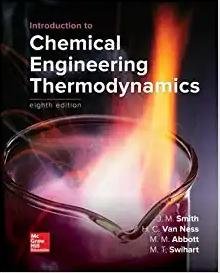Answered step by step
Verified Expert Solution
Question
1 Approved Answer
Assume that gaseous species A is absorbed in a stagnant liquid, resulting in the formation of species B in the liquid via the reversible reaction
Assume that gaseous species A is absorbed in a stagnant liquid, resulting in the formation of species B in the liquid via the reversible reaction AB The reaction rate is given by Note that the equilibrium constant K has units of inverse concentration. The reaction equilibrium strongly favors B but not quite to the extent that the reaction can be considered irreversible. The system is at steady state and the liquid layer is indefinitely thick. The liquid concentrations at the gasliquid interface x are and For simplicity, assume equal diffusivities, D
part a: State the differential equations and boundary conditions governing the concentrations Theta eta and Psi eta What is the length scale needed for converting x to the dimensionless coordinate eta
part b: Assuming that K use a perturbation analysis to calculate Theta eta and Psi eta and find the flux of A into the film, Determine the first two terms in the expansion for the flux and discuss the effect of reaction reversibility. Hint: Expand both concentration variables as regular perturbation series.
Note: use regular perturbation. For Theta eta determine the first two terms of the expansion ie solve the and problems Use Theta eta to determine the flux of A into the film. For Psi eta you only need to determine the first term of the expansion ie solve the problem For an ODE that looks like where are known constants, you should guess the solution of the form where is the homogeneous solution and is the particular solution. Guess the particular solution of the form where and are constants to be determined. Substitute this form into your ODE and compare terms with the nonhomogeneous righthand side RHS to get the constants and This strategy is called Method of undetermined Coefficients. You can use Variation of Parameters, if you want to instead.
Step by Step Solution
There are 3 Steps involved in it
Step: 1

Get Instant Access to Expert-Tailored Solutions
See step-by-step solutions with expert insights and AI powered tools for academic success
Step: 2

Step: 3

Ace Your Homework with AI
Get the answers you need in no time with our AI-driven, step-by-step assistance
Get Started


